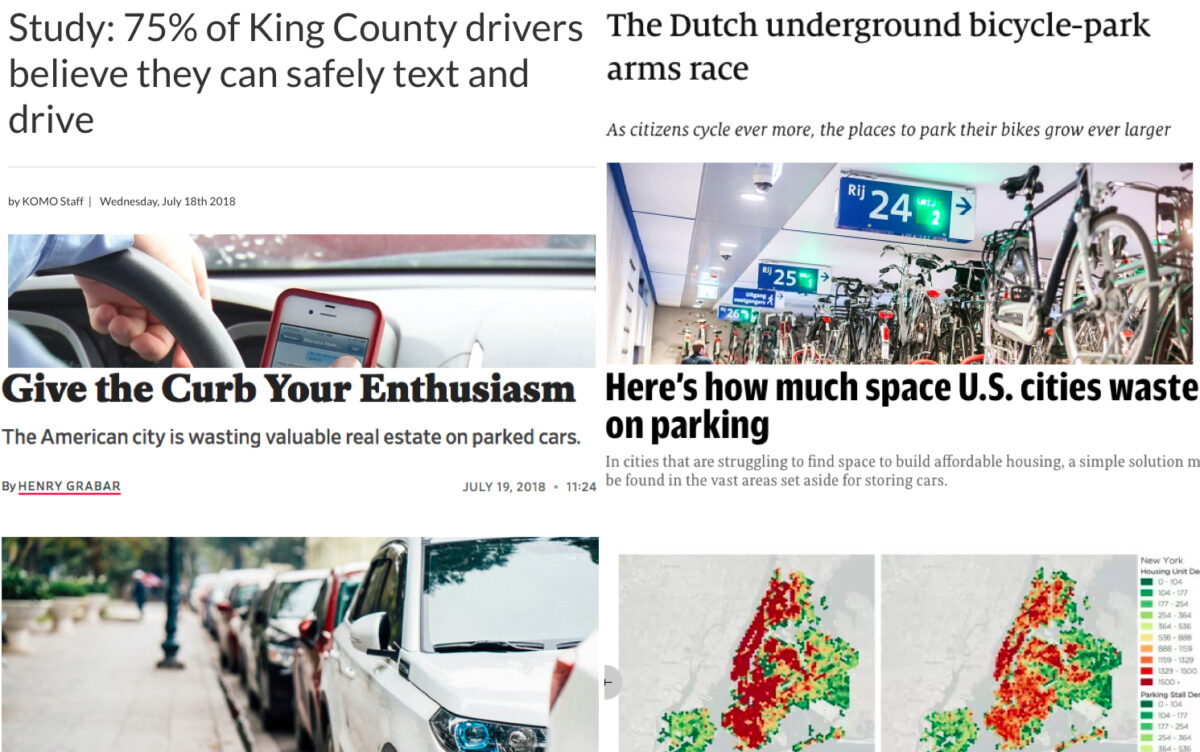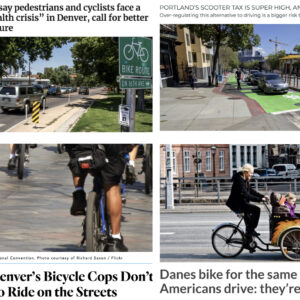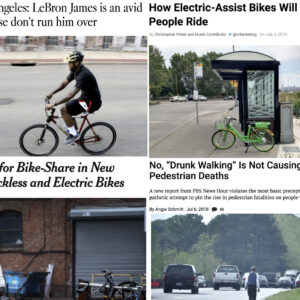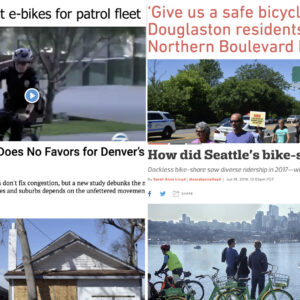Welcome to the week.
Before we get started let’s say thanks to our sponsor: The Banana Belt Fat Bike Festival. Celebrate the Southern Oregon Coast at this family-friendly event that promises fat bikes, great beaches, and great beer. Get registered at BikeGoldBeach.com.
Here are the most notable stories we came across in the past seven days…
Baltimore’s quick fix: A very hopeful story about a city effectively created protected space for people by using plastic jersey barriers.
Spokane’s cycle track: The City of Spokane, Washington is about to begin building what would be their first major downtown protected bikeway.
Inclusive transit 101: With transit investments coming from TriMet, the State of Oregon, and the City of Portland — now is a great time to better understand how to create systems that aim directly at reversing mobility disparities. Thankfully Transit Center has just released a great set of recommendations and videos.
Thank you for shutting up: The Bike Snob thinks roads are best shared when there’s no verbal interaction between drivers and bicycle riders. Not sure I agree with this 100 percent; but he makes a compelling — and as always, a funny — case.
What a waste: An analysis of parking spaces in many U.S. cities gives hard numbers to the fact that we have way more real estate devoted to car storage than we need.
Secret socialism: Allow economist Joe Cortright to explain the ways in which America has become a socialist country when it comes to one aspect of civic life: auto parking.
One more on parking: Curb space wasted on parked cars is perhaps even more of a shame than surface lots, for all the reasons expounded upon in this Slate article.
Advertisement
Pro cycling’s gender problem: This excellent roundup of facts about men’s and women’s pro cycling shows a stark contrast between the two when it comes to pay, media, racing opportunities, and more.
Bike parking arms race: Read it and weep: “The Netherlands is experiencing an underground bike-park boom, as cities race each other to build the largest.”
Safer school zones: Forget about low speed limits and/or cameras, a district in Vienna is trying an outright ban on driving as a way to keep kids safe when coming to and from school.
I drive better distracted: OMG this study from King County found that 75 percent of respondents claim they can safely drive and text. Reminds me of what people used to say about driving drunk — before we as a society made that an unacceptable thing to do.
Biking while black: Despite promises that they’d stop the practice, the Chicago Police Department continue to pull over bicycle riders for petty crimes in what is clearly more of an effort to hassle people in underserved communities than to keep them safe.
Bikes rule, cars drool: In a trove of data released for their San Francisco market, Uber says customers seem to favor their e-bikes over their cars — “In other words, Uber is disrupting itself.”
Divided by cars: Richard Florida lays out the ways in which America’s allegiance to cars and driving exacerbates the growing political and economic divisions that are tearing our country apart.
L.A.’s struggle with speeds: This article in the LA Times that explains a dangerous Catch-22 in police enforcement of speeding in Los Angeles makes me really appreciate the work of the City of Portland.
— Jonathan Maus: (503) 706-8804, @jonathan_maus on Twitter and jonathan@bikeportland.org
Never miss a story. Sign-up for the daily BP Headlines email.
BikePortland needs your support.








Thanks for reading.
BikePortland has served this community with independent community journalism since 2005. We rely on subscriptions from readers like you to survive. Your financial support is vital in keeping this valuable resource alive and well.
Please subscribe today to strengthen and expand our work.
Link for Richard Florida article missing! I happened to read this weekend:
https://www.citylab.com/transportation/2018/07/how-cars-divide-america/565148/
I’m just not sure how a grab-and-go bike can ever compete with the automobile and ten or more glorious minutes of:
“Arriving in X minutes…” (arrives X + 4 minutes later)
“No, I’m the OTHER side of the street/I can’t pull over here/Are you my ride?”
“Here is fine… Really, I’d rather not wait behind these cars… Just let me out!”
I drive better distracted: OMG this study from King County found that 75 percent of respondents claim they can safely drive and text. Reminds me of what people used to say about driving drunk — before we as a society made that an unacceptable thing to do. – wrong link on this one
Here’s one link to the story: https://nypost.com/2018/07/20/people-believe-they-can-safely-text-and-drive-people-are-wrong/
Thank you for shutting up: A driver once stopped to ask for directions to the freeway, as if it looked like I biked to the freeway a lot.
I can’t recall any positive interactions that started with a driver pulling up next to me and rolling down the window. You’d think they would try to flag down another driver, right? Oh ya, but cars isolate their occupants, so that won’t work…
During the last election season, I had a person driving a car with a sticker for the eventual president in his window stop and ask me for directions. He was very nice and polite; I can’t say that for the person in the car behind him who appeared to be giving birth to a large elephant, at least fromt the sound of things. Mind you this was on a neighborhood street on a quiet Saturday morning. So my interaction with the motorist who asked a question was positive, but the scene taken in total was a bit disheartening.
It’s almost like people with different political views are still human.
Even the human ones still can’t explain their support for trump without sounding inhuman.
Can I suggest you have a conversation with some of them, instead of assuming you know what they think?
I have had conversations with them where they say what they think. That’s what I’m talking about.
People who sincerely believe the orange one speaks for them can be mistaken, misguided, even foolish.
I had a lady in a car tell me I dropped a glove. It almost makes up for the drivers who have slowed down to tell me where I should be ridding (on the sidewalk, in the blocked by construction bike lane).
When asked directions, I just say ” Hey…I’m going there to,..follow me!
I crashed today (construction sand spread on a corner). As I was gathering up the yard sale and feeling to see if anything was broken, a driver stopped to ask if I needed help.
That’s funny I regularly give those drivers who feel i shouldn’t be on their roads directions to the freeway – it’s my standard retort!
Safer school zones: Yes, please! We only needs signs and initial enforcement.
Sure, we could do it with signs and enforcement, but the notion of closing streets around schools during the start and end of school sure gives me the warm fuzzies. I would really love to see school zones transformed into car-free zones.
And political spine. In Bolzano, Italy, they banned traffic around 6 schools 20 years ago by order of the city council. There was a lot of backlash, from residents, parents, and even teachers, and it was the city council that stood firm to make it happen.
I was a young tennis player back when Billie Jean King and others secured equal pay for women at major tournaments. It amazed me that people were arguing that the women didn’t deserve the money because they weren’t as good as the men. That may be a feature, not a bug.
How many of us could possibly climb with the pro men? It’s not even worth dreaming about; those guys are a different species than us mere mortals. However, many riders can envision being able to hang with the best women (on our best days when they’re doing a recovery ride). That makes their efforts more entertaining from my perspective. They’re not so far beyond reach as to be incomprehensible to recreational riders.
Women’s cycling is long overdue for some financial equity love. Sadly, it probably won’t come to pass unless cycling really grows as an activity so that there is perceived value in sponsorship for lots of deep pockets.
I’m guessing equal pay in bicycle racing will happen about the same time it happens for professional soccer, baseball, hockey, and basketball. It is not a cycling problem, it is an all sports issue. US women soccer players actually do very well at the world cup but get paid far less than US men who don’t even qualify. http://time.com/money/4277843/us-womens-soccer-equal-pay/
Why not just having cycling teams that don’t cater to the social constructs of gender?
For the obvious reason that the socially constructed male riders would have a huge physiological advantage over the socially constructed female riders.
Of course, cycling as a sport is dominated by people with extreme physiologies so maybe it would benefit from a division for people with normal physiologies.
I like it – they could have three divisions:
1 physiological freaks
2 scientifically enhanced physiological freaks
3 normal people.
Seriously, I have always wondered if some of the top women cyclists could ride with the men. Power stats make it look possible.
Do a little search under the name “Beryl Burton.” You will be in awe.
I would imagine people are ok with unequal payouts because they hold the view you espoused that the best pro-women are not “a different species from us mere mortals” (like the men) but are “not so far beyond reach as to be incomprehensible to recreational riders.”
I mean, really if any recreational ale rider can hang with the top women in the world (hard eyeroll) – then why bother paying them like the elite athletes they are.
Well said.
B. CAREFUL what you say, I’m sure it wasn’t meant to be such a sexist statement, but it’s kinda ridiculous – the top women will leave recreational male riders in their dust .. on their worst and best days, respectively.
There is data on this. In terms of pure power (watt/kg) the women World Tour-level pro racers are superior to all male racers other than domestic pro racers. Then add the ability to lay down that power during a 100 km mountain stage and 120 kmh descents . . .
https://cyclingtips.com/2017/06/just-good-female-pro-road-cyclists/
That was interesting–thanks for the link!
Many years ago, as a strong young rider I was not accustomed to being past on a long climb, when a rider passed me like I was standing still and still had the breath for a cheerful good morning. I’d been chicked and I recognized the lady but couldn’t place her. I spent the rest of the ride wondering where I would know a women that could ride like that. Turns out, I didn’t know her. I had just seen her on TV wining Olympic medals.
Sheer lunacy, the LA “system” of setting speed limits! And it explains the mess in Portland, too (new residents used to driving a certain way). I see people speeding and jerking to a halt, jerking forward from a halt, even in the middle of the night on a deserted road. It’s an execrable HABIT of speeding and driving recklessly. Gawd, I hate it.
Ugh–yes. I will never be able to understand why ‘not fair’ is ever a reasonable argument against safe speed limits and effective traffic enforcement. It’s not as if drivers can’t help speeding. If the police get rich off of tickets for traffic violations, well and good. All people would have to do to overturn the gravy train is stop driving recklessly.
“The Bike Snob thinks roads are best shared when there’s no verbal interaction between drivers and bicycle riders.”
This needs to be expanded to interactions between bicycle riders too.
re: Spokane’s Riverside Ave. bike lane or cycle track. The jury is still here, one because John Forester’s vision of take a lane is cheaper for Spokane, which is more auto friendly then other cities in the Northwest and not any safer. Less people riding = less infrastructure required. The concept of a Dutch intersection is however in the survey but not by name and I learned here that it was Bicycle Advisory Board– excellent! The cost of concrete and keeping all mode users safe vrs. ease cleaning snow and getting right hooked is still being debated for the intersections and lanes. Ms. Kate Burke the council women from NE Spokane sponsored a bicycle show and tell last week and there were few fellow cyclists that were not aware of the survey including me. Hopefully that will change for the better before a decision is reached.
What I find most interesting about the proposed Spokane protected bike lanes is not so much where they are located nor the technical details, but rather as the traditional “second city” of Washington state, they won’t do anything new or innovative until Seattle has done it first. You see that pattern in many states, including here in NC, where everyone waits to see what Charlotte does (or doesn’t do) with light rail, green bike lanes, bike boxes, etc. In general, college town experiments don’t count towards influencing conservative big city decision-making processes, only other usually bigger cities really count. For example, Eugene has since the 70s had its really innovative Amazon bike expressway, complete with off-ramps, but rather strangely Portland never did anything anywhere remotely like it, ever. Instead, Portland was/has been more influenced by Vancouver BC.
It’s less imagining that, even in my youth, I could match some of the great women athletes, but more that sometimes the women are more fun to watch.
I’m a huge basketball fan (I played organized ball from age 6), and many years ago the NBA and then men’s college ball became impossible to watch. Then Portland got the fire and I fell in love with the game again. Lower physical capabilities drives a return to better team ball, and it’s inherently more fun to watch.
Women’s soccer isn’t quite as much fun as the EPL, but more than the MLS. And I defy anyone who saw Halep v. Davis at the Australian to tell me that 2 smaller, not terribly powerful, women can’t keep you glued to a match.
(also – Naya Tapper would have run right over me when I was a college athlete – Wow.)
MLS is a low bar.
Parking – I firmly believe that governments should require motorists to pay to park on public land, and so as not to unfairly compete with private parking facilities, the price the government (city/county/state/federal) charges should be similar to fees charged by private entities. Now, I live in North Portland, we have an attached garage, where we park one car, but we park another on the street in front of the house. I would have no objection whatsoever, if the city imposed a street parking fee – as long as I could pay monthly/quarterly/annually. We might actually decide it’s not worth paying and park in the driveway, or sell the second car (reality – I commute by bike from early May to late September, and could change to an e-bike for year round bike commuting – we could also use Uber/Lyft/Car2Go etc. to supplement the car situation).
Why do we provide parking welfare to motorists?
>>> I firmly believe that governments should require motorists to pay to park on public land, and so as not to unfairly compete with private parking facilities <<<
This is exactly why I oppose public schools — why should the government be competing with the private sector?
Snarkiness aside, I've often said I would happily pay market price (set by auction) for a specific, dedicated on-street parking spot in front of my residence.
The late great Hunter S. Thompson opined that “chemical parity” was essential for truly competitive sport.
One wonders what those lady racers are dosing to be competitive in the dirtiest of all sports.
Given the average woman World Tour bike racer makes about $13,000/yr and the teams are similarly starved for budget, I doubt they can afford serious chemical programs.